Latest press releases
A selection of stories from across the Federation

Netherlands
Rutgers triumphs in landmark court case against lies, online hate and disinformation
Rutgers, the Netherlands’ leading sexual and reproductive health expert and IPPF’s Member Association, has today secured a landmark legal win against an ultra-conservative group.
For media enquiries

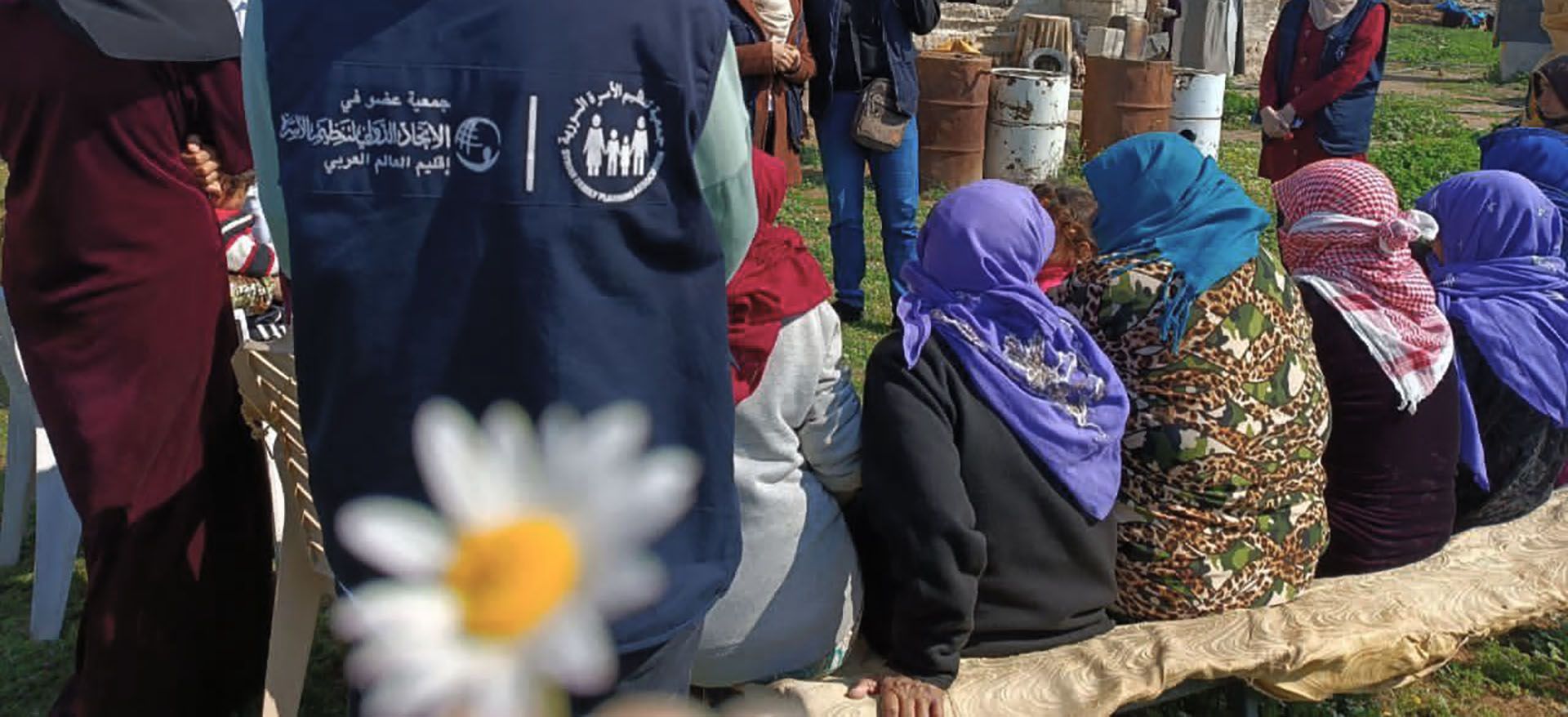
| 11 December 2024
We Must Protect Critical Sexual and Reproductive Health and Rights During Syria's Transition
IPPF remains steadfast in its commitment to supporting its Member Association, the Syrian Family Planning Association (SFPA), in providing essential SRHR services for all. Within the uncertainty and instability, we continue to work together with SFPA to empower communities, protect the rights of women and adolescents, and address the urgent needs of marginalized populations, particularly in the face of increased vulnerability. Our collective mission stands firm: we are committed to ensuring that dignity, health, and choice are accessible to all, regardless of political or social challenges. Even in these uncertain times, we believe that SRHR services must continue - because the need for family planning, maternal healthcare, and gender-based violence (GBV) support does not diminish, even in the midst of conflict. Syria is enduring a difficult period of transition, but sexual and reproductive health cannot be sidelined. The health and well-being of Syria’s most vulnerable populations, especially women and youth, remain a top priority. The work of SFPA is more essential than ever, as it continues to provide vital services such as family planning, postnatal care, and GBV screening. At Al-Hasakah, SFPA is on the frontlines, directly supporting over 5,000 people, the majority of whom are women in urgent need of reproductive healthcare services. These women face an increased risk of complications due to the lack of access to safe and comprehensive health services, but SFPA is committed to meeting their needs. From providing postnatal care to offering family planning options and GBV screenings, SFPA is ensuring that women in these vulnerable circumstances are not forgotten. SFPA’s clinics, such as the one in southern Daraa and the besieged Al-Waer in Homs, have become lifelines, serving as a beacon of hope for those in need. They provide up to 70 beneficiaries a day with crucial services, including health counselling and early marriage awareness. SFPA has faced significant challenges, including the seizing of vehicles and temporary clinic closures in the suburbs of Homs. Yet SFPA's perseverance in delivering SRHR services remains an essential lifeline for the people of Syria. We will continue to stand alongside SFPA in their tireless efforts to safeguard sexual and reproductive health rights, ensuring that every woman, adolescent, and marginalized person has access to the care they deserve. Together, we stand for dignity, health, and choice, even in the face of uncertainty. The challenges are great, but the importance of maintaining SRHR services is immeasurable. Through unwavering dedication, we can support those in need and contribute to a future where everyone has access to the care and rights they deserve. Contact: +44 7918 845944 Image credit: SFPA/Wasim Kashlan
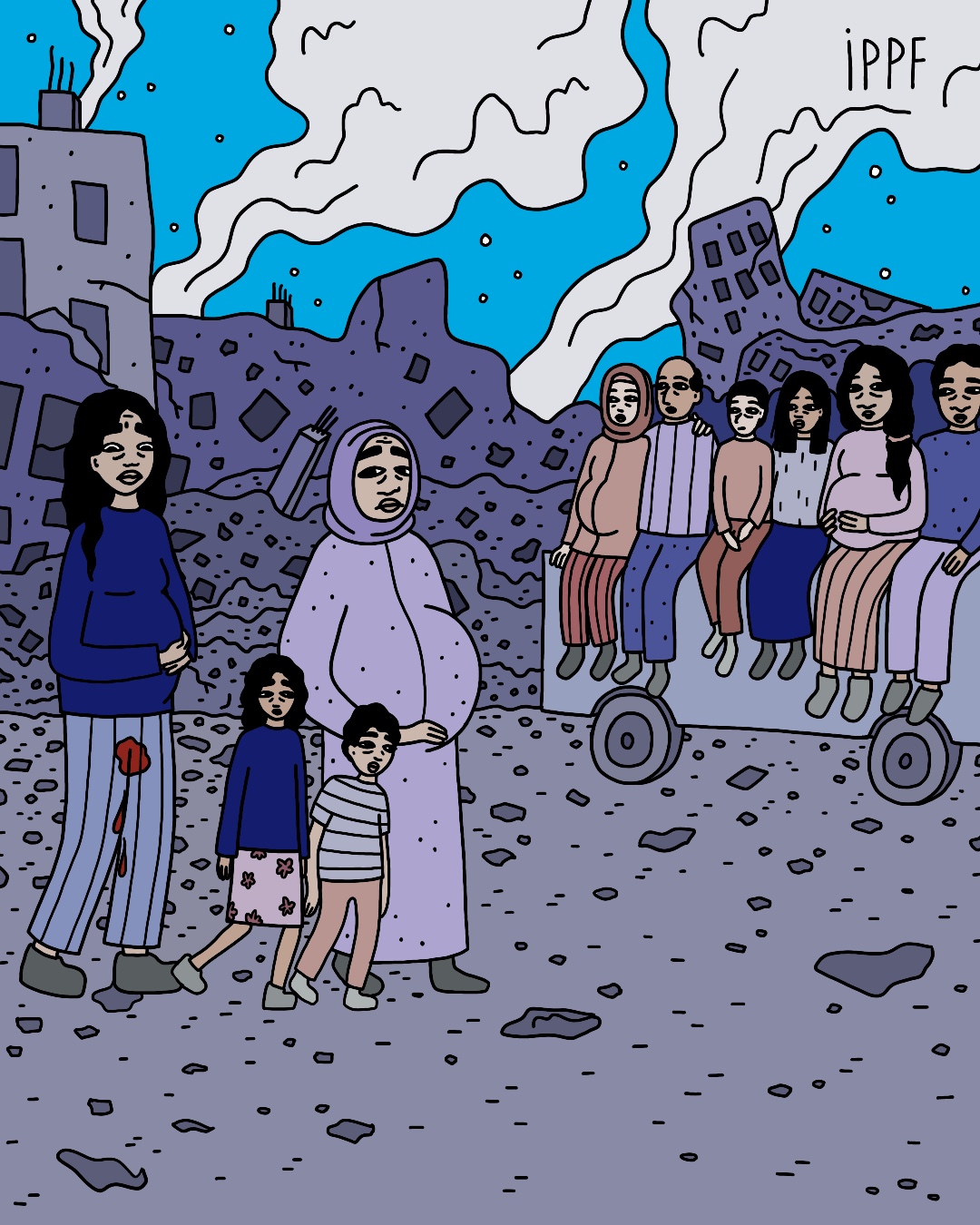
| 09 July 2024
Press Release: Gaza nine months on, pregnant women carry the burden of conflict
Jerusalem, 9 July 2024: Nine months on since the start of the Israeli aggression in Gaza, maternal healthcare is almost decimated. Pregnant, postpartum, and breastfeeding women in Gaza are facing serious health consequences. Miscarriages have risen at least 300% since October last year. One of our own health workers from the Palestinian Family Planning and Protection Association (PFPPA) recently lost her pregnancy due to the stress of the attacks. “I am a healthcare worker with PFPPA, and I have been forced to flee not once, not twice, but six times since the start of the violence, with my husband and three small children. Our home was destroyed by bombing. Whilst I was fleeing from one location to another, I started to unexpectedly bleed. I was able to find a doctor only after reaching Rafah, who confirmed I was miscarrying. I didn’t even realise I was pregnant,” Wafa, our healthcare worker in Gaza, told us. With the starvation being faced by the people in Gaza in addition to the lack of drinking water, our service providers are reporting on daily basis of pregnant women suffering from anaemia, malnutrition and in desperate need of prenatal vitamins and supplements. Our service providers in Gaza are also witnessing many women who are either having premature deliveries or miscarriages. Women of newborns are unable to breastfeed their babies due their own malnutrition and anxiety, while at the same time most families cannot afford milk formula as prices are becoming extremely high - and that is if they can find it in the market. When medical facilities are available, many women are unwilling to leave their shelters to obtain pre- and post-natal care, as they worry if they are separated from their families there will be military attacks and bombings and fear for their and their loved one's fate if they do so. Ammal Awadallah, Executive Director of PFPPA, said: “Nine months on, and a woman who conceived at the start of these hostilities will now be giving birth. But where, how, and what life is that baby entering? This will be a lost generation in Gaza, a generation born into genocide. We’re doing the best we can to offer support to women in Gaza, but the conditions to get aid into Gaza, let alone warehouse supplies, make our jobs extremely difficult. PFPPA has always been committed to women’s health and that doesn’t stop, now or ever.” Over 37,900 people have now lost their lives in Gaza. Women and girls that survive are facing a myriad of challenges; deprived of sexual and reproductive health services, sanitary and hygiene products. We believe every single person and organisation needs to mobilise to end this, by calling on their governments to demand unhindered humanitarian aid access, to demand a permanent ceasefire, and divest from any organisations aiding and abetting Israel’s military campaign against Palestine. We are working in close collaboration with colleagues in Palestine on how best to serve those caught up in the violence, to ensure health workers are safe and able to provide sexual and reproductive health care without threat to life. For more information and to speak to our Executive Director in Palestine, please email [email protected] About the Palestinian Family Planning and Protection Association Established in Jerusalem in 1964, the Palestinian Family Planning and Protection Association (PFPPA) is locally registered as an independent, non-profit and non-governmental association with headquarters in Jerusalem. PFPPA has service delivery points located in the West Bank Areas of Ramallah, Bethlehem, Hebron and Halhoul, in addition to one in the Gaza Strip, which has yet to be relocated after it was destroyed following an Israeli airstrike on 8 October. Furthermore, and in cooperation with local partners, PFPPA is also responsible for three safe spaces to provide Gender Based Violence (GBV) related services in the Jerusalem area. About the International Planned Parenthood Federation IPPF is a global healthcare provider and a leading advocate of sexual and reproductive health and rights (SRHR) for all. Led by a courageous and determined group of women, IPPF was founded in 1952 at the Third International Planned Parenthood Conference. Today, we are a movement of 150 Member Associations and Collaborative Partners with a presence in over 146 countries. Our work is wide-ranging, including comprehensive sex education, provision of contraceptive, safe abortion, and maternal care and responding to humanitarian crises. We pride ourselves on being local through our members and global through our network. At the heart of our mission is the provision of – and advocacy in support of – integrated healthcare to anyone who needs it regardless of race, gender, sex, income, and crucially no matter how remote.
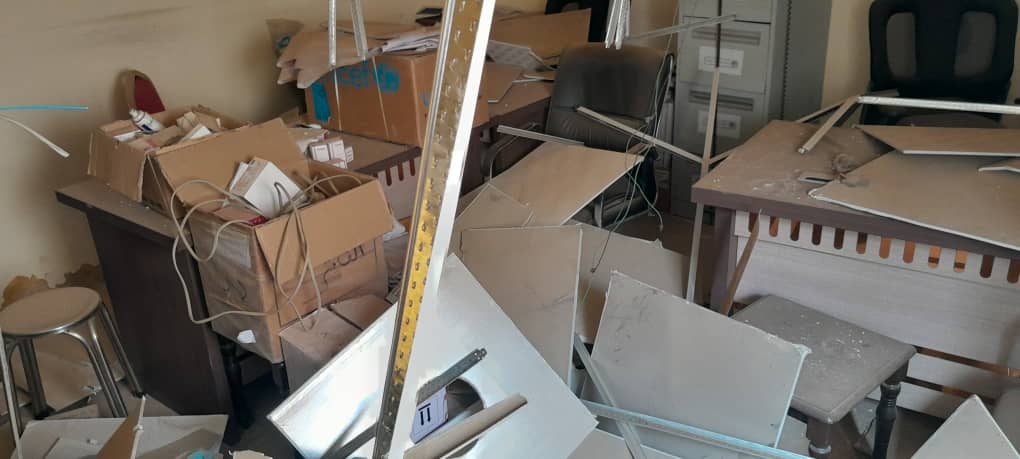
| 02 July 2024
Another of our clinics in Sudan has been attacked, one less safe place for women and girls to get sexual and reproductive healthcare
Haz click aquí para leer este posicionamiento en español. Khartoum, 2 July 2024: Another horrendous attack on one of our healthcare clinics in Sudan has occurred this week. Several staff and volunteers from our Member Association in Sudan, the Sudan Family Planning Association (SFPA), have now been injured or killed by the Rapid Support Forces (RSF). Our clinic in El Fasher has been destroyed, meaning there is one less option for women and girls to receive lifesaving sexual and reproductive healthcare in the region. For over a month, ongoing battles around El Fasher, the capital city of North Darfur, have been taking place.The RSF, who have stationed themselves 10 kilometres from the city, have been indiscriminately shelling military and civilian targets. One of our SFPA volunteers, Mahasen Abdul Jabbar, was killed after being hit by gunshot at the clinic. This morning, Dr Daifallah Mohammed, a volunteer family medicine specialist in our El Fasher clinic, also died as a result of the warfare. The RSF bombardments have also severely injured several of our staff: Dr Marwa, a doctor at the Integrated Centre in El Fasher, was hit by shrapnel in her leg. A midwife at Abu Shouk centre, Halima Abdullah Adam, was hit and four of her children were injured and evacuated. The house of the guard of Abu Shouk centre was hit, killing his daughter and wounding four of his other children. One of our nurses has been hit with shrapnel and has been transferred to hospital and is in critical condition and all contact with her has been lost. The RSF has also been kidnapping our patients, their whereabouts unknown. This latest attack is on top of previous attacks on our clinics in Sudan, which destroyed our facilities in Khartoum and El Fashir and health centres run by SFPA between 7-9 September 2023. Women and girls in Sudan are facing an upsurge in sexual and conflict-related violence. Our staff have witnessed firsthand the impact of this heinous crime on the most vulnerable people, including women, girls and other marginalized groups. We previously reported that rape victims and survivors are struggling to obtain contraception, abortion medication and post-exposure anti-viral medications. They face severe and life-threatening consequences, including loss of family support and homes and shelters and increased risk of suicide. Survivors are afraid to seek medical treatment because of the stigma and fear of reprisals from rape. Fadoua Bakhadda, Regional Director, Arab World Region, said: “We unequivocally condemn all violence against civilians, especially against health centers that are attacked while providing essential services to those in need. Such acts are an affront to humanity and the sanctity of care. The murders, displacement and destruction in Sudan must stop. It is vital that warring parties remember their obligations under International Humanitarian Law, which include ensuring the protection of civilians and the protection of health structures and health personnel.” Dr Alvaro Bermejo, Director-General of IPPF, said: “We are devastated to learn of another attack on one of our clinics in Sudan, and the injuries and loss of lives to our staff and volunteers. Healthcare facilities, and most importantly, healthcare workers, must never be the target of war. The sexual and reproductive health and lives of 800,000 people in North Darfur – including women, children, and people with disabilities – are hanging in the balance as bombing and shelling cause widespread harm to civilians and severely disrupt the essential health services they very much depend on. Now, more than ever, our healthcare facilities must be protected so they can continue to provide care to the populations enduring these needless attacks. Our clinic, which previously was able to provide lifesaving sexual and reproductive healthcare such as prenatal care and contraceptives, is gone. Where will women and girls seek these services now? There must finally be a critical mass of people of conscience saying enough is enough in this forgotten crisis.” For more information and to speak to one of our staff in North Darfur, Sudan, please email [email protected] About the Sudan Family Planning Association The Sudan Family Planning Association (SFPA) was established in 1965 by pioneers in obstetrics and gynaecology in response to increases in maternal, neonatal and infant mortality and morbidity. As the statistics show, Sudan is a country in great need of frontline sexual and reproductive health (SRH) services. Advocacy, and undertaking information, education and communication (IEC) programs are critical. In 2023, SFPA provided 38 million services through 25 clinics, 272 associated clinics, 39 mobile clinics, 1494 CBD/CBS, and digital/Virtual channels. Since the start of the crisis on 15 April 2023, the association teams were successful in providing 8 million services through 25 SDPs and 10 million services through non damaged associated and mobile clinics. SFPA was able to assist 1,183 deliveries under bombardment and provided 170 943 treatments of HIV in its static clinics. About the International Planned Parenthood Federation The International Planned Parenthood Federation (IPPF) is a global healthcare provider and a leading advocate of sexual and reproductive health and rights (SRHR) for all. We are a movement of 150 Member Associations and Collaborative Partners with a presence in over 146 countries. Building on a proud history of 70 years of achievement, we commit to lead a locally owned, globally connected civil society movement that provides and enables services and champions sexual and reproductive health and rights for all, especially the under-served. We advocate for a world where people are provided with the information they need to make informed decisions about their sexual health and bodies. We stand up and fight for sexual and reproductive rights, and against those who seek to deny people their human right to bodily autonomy and freedom. We deliver care that is rooted in rights, respect, and dignity - no matter what.
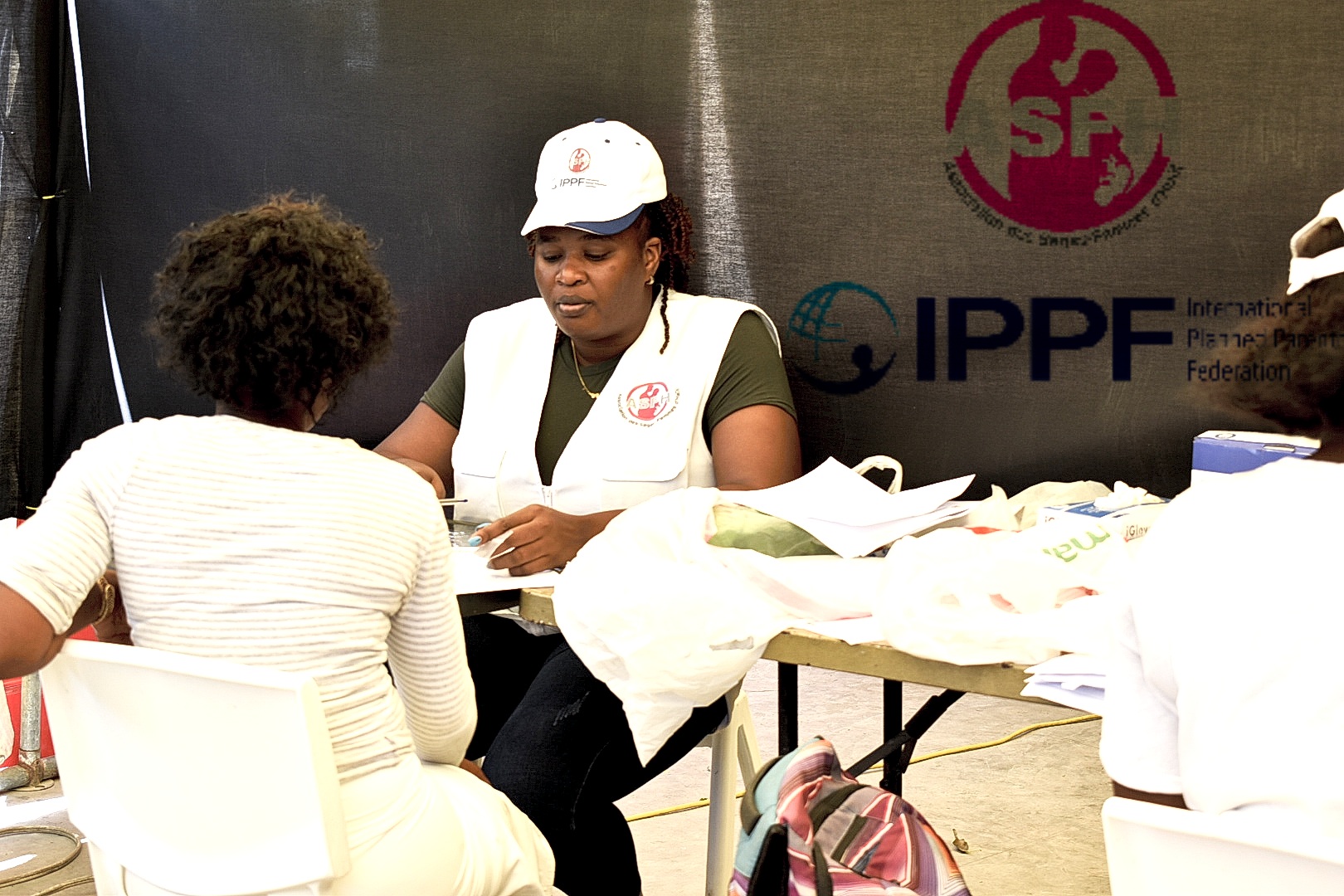
| 19 June 2024
IPPF Statement on the Ongoing Violence in Haiti
Haz click aquí para leer este posicionamiento en español The International Planned Parenthood Federation (IPPF) is deeply concerned about the escalating violence and political instability in Haiti, particularly its disproportionate impact on women and girls since March 2024. This crisis is expected to leave 3,000 pregnant women without essential medical care, leading to nearly 450 women experiencing life-threatening childbirth complications. With almost 580,000 Haitians displaced, women and girls are experiencing an alarming surge in sexual and gender-based violence (SGBV), including rampant sexual assaults, torture, and collective rape by armed groups. From January to March 2024, there were 1,793 SGBV incidents reported. Conflict-related insecurity has also significantly increased negative coping mechanisms, contributing to the rise in SGBV, as well as sexually transmitted infections and HIV. The ongoing violence is preventing access to essential sexual and reproductive healthcare services, endangering the lives of mothers and newborns. Our partner in Haiti, the Haiti Midwives Association, informed us, ‘the gangs prohibit the movement of motorcycles and pedestrians, threatening and sometimes shooting in the air to terrorise us further. Due to these difficult conditions, fewer and fewer patients are attending the hospital, whether for prenatal consultations, deliveries or postnatal care.” This inaccessibility has led to a significant increase in maternal and infant mortality. Eugenia López Uribe, Regional Director of the IPPF Americas & the Caribbean, said, “Humanitarian aid must be granted access through local organisations, such as our partner the Haiti Midwives Association, and their wellbeing must be guaranteed in this process. Women and girls can no longer wait! Our partner has provided access to vital emergency services such as pregnancy, childbirth and postpartum care, as well as care after sexual violence for 20 years. However, since February, they have been forced to stop their activities because of the imminent risks they face as women living in Port-au-Prince and surrounding areas.” On this International Day for the Elimination of Sexual Violence in Conflict, IPPF calls for zero tolerance toward any form of SGBV and demands the immediate protection of Haitian women, children, and those most at risk. We strongly call for unhindered humanitarian access to allow aid into Haiti. This aid must be designed and controlled by local NGOs and aid workers, and any foreign peacekeepers must safeguard and protect local communities - in particular their sexual and reproductive rights - so mistakes of the past are not repeated. Let’s not forget: Haiti's poverty and instability has been shaped by decades of foreign occupation and colonialism. The international community owes Haiti more than mere condolences; they owe an unwavering commitment to a future where human rights, including sexual and reproductive health rights are respected and protected, and nobody is left behind.
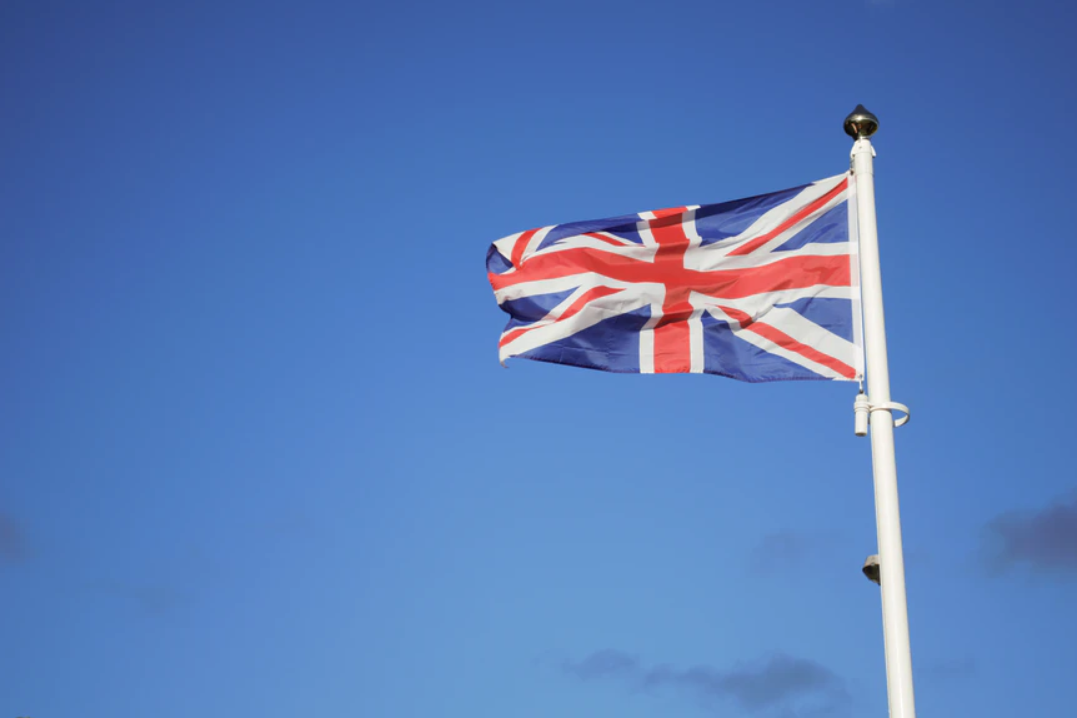
| 17 November 2022
UK Autumn budget doesn't go far enough
If you are covering the UK autumn budget and reporting on foreign aid, you may find the below statement from the International Planned Parenthood Federation (IPPF) helpful: “The UK government has already decimated the aid budget and its reputation through severe economic mishandling, cutting billions from the very things that protect people during economic, political and social upheaval, including life-saving sexual and reproductive healthcare. “It is also the only country to be spending the majority of its dedicated overseas aid budget within its own borders, taking advantage of legislation to pay for refugee and asylum costs in the UK rather than increasing domestic and overseas budgets accordingly. “The UK government cannot continue to fight the fire of one humanitarian crisis by diverting much-needed resources from other vulnerable people, nor continue to balance its books on the backs of the poorest people in the world - who, as MP Andrew Mitchell stated, will be damaged, maimed, or die as a result. “This government promised to give women and girls the freedom they need to succeed and prevent the worst forms of human suffering worldwide. If it is to deliver on its promises and revive its sunken reputation, it must spend dedicated budgets correctly, support people in the UK and beyond appropriately, and MP Andrew Mitchell and the Chancellor must ensure a return to the 0.7% as soon as possible.”

| 03 March 2022
Statement on the growing humanitarian crisis in Ukraine
Over the past few days, the world has watched in horror and disbelief at the events unfolding in Ukraine. It is estimated that over 500,000 people have now fled – many of whom are women and children – into neighbouring countries such as Poland, Hungary and Romania. The UN anticipates 4 million refugees by July 2022. During Humanitarian crises, sexual and reproductive healthcare is often overlooked. But the reality is daily sexual and reproductive healthcare needs such as essential care for pregnant people, access to menstruation products for people who menstruate, as well as ensuring people who need sexual and reproductive health assistance have access to the right information, remains an urgent priority. IPPF is working with partners on the ground in Poland to link those fleeing the conflict with critical sexual and reproductive health services as well as provide them with essential items. Julie Taft, Director of Humanitarian for the International Planned Parenthood Federation, said "As we mark one week since the invasion of Ukraine, the complex humanitarian situation has become even more apparent. Right now, millions across the country are fighting for their survival, while food, medical supplies and essential hygiene products run dangerously low, including equipment needed to provide life-saving sexual and reproductive healthcare. The destruction of healthcare infrastructure also means that women are forced to deliver their babies in bomb shelters. At the same time, sick and vulnerable new-borns must receive care in the basements of hospitals. "In response to the growing humanitarian crisis, the International Planned Parenthood Federation has partnered with the All-Poland's Women's Strike, a Polish women's rights movement currently supporting people displaced by the war. The $50,000 USD grant will go towards dignity kits, consisting of basic hygiene supplies, menstrual-hygiene products, blankets, food, diapers and baby clothes. Items will be distributed to Ukrainians who have fled into Poland as well as transported cross-border into Ukraine. The funds will also support the All-Poland's women's strike to link refugees who have crossed the Ukraine-Poland border with essential healthcare services. "IPPF is proud to partner with such a brave and unyielding organisation on the frontline and will continue to work closely with other NGOs to facilitate care for those who need it most. However, NGOs cannot operate efficiently without the support of the international community, which must guarantee the safe passage of humanitarian aid into Ukraine. The urgent need for unhindered humanitarian access is especially significant for unaccompanied minors and those left behind, who are often the most vulnerable populations and who will require distinct care during this tragic situation." Marta Lempart, Founder of the All-Poland Women's Strike, said: "We are deeply committed to helping displaced people flee the invasion of our neighbour, Ukraine. Our teams across Poland are working around the clock to support vulnerable people crossing both at the border, including unaccompanied minors at-risk of trafficking and those left behind or heading back to Ukraine. Both groups will require personalised care and support. "We are pleased to partner with the International Planned Parenthood Federation, so we can continue delivering dignity kits to those who need them most; for displaced people arriving with just the clothes on their back, access to even simple necessities are a lifeline. We are also thankful for the outpouring of support from across Europe - the funding will help care for exhausted families who have made it safely across the border, covering transport, rent, bills and other expenses as they begin to build their futures outside of Ukraine. "Disasters reinforce, perpetuate, and increase existing inequalities, making bad situations even more tragic and resulting in consequences that will carry down for generations. But with the international community's support, we can ensure that organisations like Women's Strike and IPPF are there for people every step of the way." Click here if you would like to donate to IPPF's Ukraine Appeal. For media enquiries, please contact Karmen Ivey on [email protected] or [email protected]

| 21 February 2022
Statement on the Guttmacher Institute's “Just the Numbers” report: a snapshot of the impact of the UK aid cuts
The Guttmacher Institute has today released new data showing the impact of the UK aid cuts on sexual and reproductive health and rights for the fiscal year 2021 - 2022. The figures show the devastating impact on the lives of women and girls around the world. Together with the effects of the Covid-19 pandemic, the cuts threaten to undo years of progress towards gender equality and increasing access to reproductive choice. When surveyed, major sexual and reproductive health organizations reported they expected to receive at least £218.9 million in the fiscal year (FY) 2021–2022 (from April 2021 to March 2022) for family planning activities in low- and middle-income countries. The resulting cuts to the family planning programs of these major program-implementing organizations are estimated to have totalled £132.4 million in FY 2021–2022. The loss of funding will result in: 9.5 million fewer women and couples receiving contraceptive services 4.3 million more unintended pregnancies 1.8 million more unplanned births 1.4 million more unsafe abortions and 8000 more maternal deaths The figures also show how much could have been achieved through sustained UK aid spending. IPPF’s Director-General, Dr Alvaro Bermejo, said: “The Guttmacher figures are a harrowing, but sadly unsurprising, insight into the catastrophic impact that the UK aid cuts will have on the health and lives of millions of women, girls and marginalized people across the globe, and serve to confirm what sexual and reproductive health charities have been saying since they were first made aware of the cuts. “We must also remember that the Guttmacher numbers are just a snapshot of the 2021 – 2022 fiscal year, and the effects of the Government’s sudden and short-sighted termination of support will stretch far beyond that, piling unthinkable pressure on people already dealing with the fallout of the COVID-19 pandemic, and leading to millions of unintended pregnancies and thousands of preventable deaths. “With the upcoming spending review in November, we ask the UK Government to reconsider the cuts, which IPPF still believe to be outside of the boundaries of the law, and reinstate the 0.7% commitment, so that it can finally deliver on its promises to the millions of people it chose to abandon.” IPPF also signed on to a joint letter from the UK SRHR Network. For media inquiries please contact [email protected]

| 21 February 2022
Statement on the first anniversary of the rescindment of the Global Gag Rule
28 January 2022 heralds one year since President Biden rescinded the harmful Global Gag Rule (GGR). Otherwise known as the Mexico City Policy, its expansion in 2017 under Trump affected 12 billion dollars of funding, impacting thousands of life-saving healthcare services worldwide – especially across low-income countries. But while rescindment is a positive first step, the long-term harm of the Global Gag Rule lingers on. For IPPF, 53 healthcare projects in 32 countries were hit, with some Member Associations losing up to 60% of their funding. Programmes affected include HIV prevention and care, maternal health and nutrition, STI services, gender-based violence prevention, and services for vulnerable children. And although we have begun to re-establish long-standing partnerships, it takes time for funding to flow and to re-open closed healthcare clinics and community services – with some lost forever. In the meantime, there are women and girls who desperately need healthcare that have nowhere to turn. But in February, the US Congress has an opportunity to change the sexual and reproductive health landscape forever through a final negotiated funding bill that includes a permanent end to the deadly Global Gag Rule. As we celebrate one year of rescindment, we know the work is not done yet, but we are hopeful for the futures of millions of women and girls worldwide. We urge the US Congress to permanently repeal the Global Gag Rule to fully eradicate the lasting impact of the Mexico City Policy that has harmed women and girls around the world for 40 years. Dr Alvaro Bermejo, Director-General of the International Planned Parenthood Federation, said: "Five years ago, Trump expanded the Global Gag Rule, a devastating neo-colonialist policy that forbids US aid to any organization that supports access to safe abortion care, disproportionately affecting women and girls in low-income countries. Today we mark one year since President Biden rescinded it, but the long-term harm and impacts don't simply go away. "The Gag Rule is a callously designed mechanism set up to deny women and girls the right to decide what happens to their bodies. Its implementation doesn't just destroy life-saving abortion services but erodes access to other sexual and reproductive healthcare, including contraception, leading ultimately to increases in unintended pregnancy and forcing many to turn to unsafe and dangerous abortion methods. "While rescindment is a positive first step, the looming threat of reinstatement under future anti-rights administrations undermines the sustainability of global sexual health programs and the pace of progress. After 40 long years, the time to act is now – we urge the US Congress to end this political game and stand up for the futures of millions of at-risk women and girls by permanently repealing the Global Gag Rule. "By leaving a legacy that gives hope and stability to the sexual and reproductive health of people worldwide, the US will once again be a champion, leader, and innovator of human rights for all." For media inquiries please contact [email protected]
















